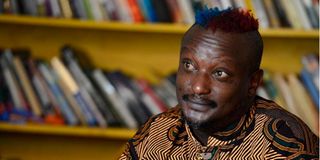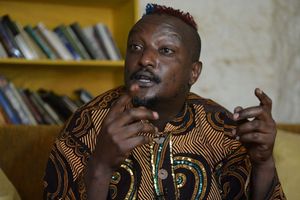
“It is a Sunday. I am nine. We are sitting on a patch of some tough nylon grass next to the veranda. Mum has brought out her Ugandan mats. I am reading a new book. I am reading a new book every day now. This book is about a flamingo woman; she is a secretary, her stick-like legs improbable in cloggy high heels, her handbag in her beak. Flying away. The flamingo book came with a carton of books my mum bought from American missionary neighbours who were going back home.
"The sun is hot. I close my eyes and let the sun shine on my eyelids. Red tongues and beasts flutter, aureoles of red and burning blue. If I turn back to my book, the letters jumble for a moment, then they disappear into my head, and word-made flamingos are talking and wearing high heels, and I can run barefoot across China, and no beast can suck me in, for I can run and jump farther than they can. On my trampoline of letters and words,” so wrote the late Binyavanga Wainaina in his book, One Day I Will Write About This Place.
May 21, 2024 marked 5 years since the 2019 death of Binyavanga Wainaina and this is a good time to reflect on the legacy of one of Kenya’s most revolutionary writers.
He was as restless as the words he wrote: always flying away like the “Flamingo woman” in his book. Literature is about flights of fancy. Binyavanga understood this.
Leo Tolstoy said that there are only two plots in all of literature: a person goes on a journey or a stranger comes to town.
Diana Gabaldon, the American fiction and fantasy writer captured aptly the root of flights of fancy when she wrote in her famed Outlander series book 1 that, “People disappear all the time. Ask any policeman. Better yet, ask a journalist. Disappearances are bread-and-butter to journalists. Young girls run away from home. Young children stray from their parents and are never seen again. Housewives reach the end of their tether and take the grocery money and a taxi to the station. International financiers change their names and vanish into the smoke of imported cigars”.
Binyavanga probably wanted to find out what it was like to vanish into the smoke of imported cigars. His curiosity always probed other places and other people. To go elsewhere even if it was through imagination.
He summed this fittingly in One Day I Will Write About This Place when he wrote that, “What a wonderful thing, I think, if it was possible to spend my life inhabiting the shapes and sounds and patterns of other people”. And he also fancied following other roads other than the one he was on. Once, he heard Maasai morans (warriors) sing and he imagined what it would be like following them, “…traveling around, to avoid my parents, to follow a road and think about things other than what is wrong with my life”.
He always imagined himself on another road in another life in another place.
However, Binyavanga could also write about the mundane — transforming it into something of wonder. He writes about flamingos, “I look up to watch the flamingos rise up from the lake, like leaves in the wind... The wind swoops down, God breathes, and across the lake a million flamingos rise…”.
He paints a picture so clear that the reader doesn’t have a difficult time conjuring up the scenes — the words bouncing gently up and down, in an almost piercing rhythmic squeak.
He was also a poet of the city. He wrote in One Day I Will Write About This Place that, “We drove to Nairobi today, my father and I, to the city. I have five pimples. The capital city, for me, is the opportunity to spend time on soft teenage hydraulics — bookshops and burgers and Right On magazine and soft-cheeked girls who say ‘That’s fantabulous!’”
He captures Nakuru as well as he does Nairobi. Like a poet of unrequited love. He can capture late mornings as easy as he does long, lazy afternoons.
He can capture that distant silhouette of a Nairobian like a leper without a home — lonely and hungry, sitting at Uhuru Park as people walk by and, from a distance, Nairobi looking metallic, brusque and impervious like a brutal master.
The stench of business hanging heavy in the air — everything costs money and one has to be constantly on the lookout for conmen, scammers, thieves, money-hounds and other wannabes.
Dangerous place. Newcomers always felt small and shrunken, muffled by the vastness of the city. Or bleary-eyed, tears streaming down as one walks in a shambling gait down the street, trailed by foggy air.
That’s Binyavanga territory. And he also captured the smouldering wreckage of Kenya. Like that fateful afternoon in 1982 after the failed coup attempt.
Binyavanga wrote, “In the afternoon, the coup is put down, and thousands are killed. Nairobi has corpses everywhere”.
Kenya haunted Binyavanga, tormenting him like an abusive lover — but there were always echoes of nostalgia in his works for his motherland.
Rest easy, Binya. You flew far, far away. It’s been five years already, yet have we not forgotten thee. Death, be not proud.
The writer is a book publisher based in Nairobi. [email protected]







